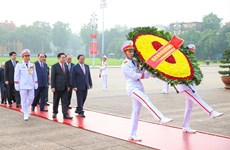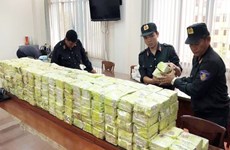NA hearings focus on pricing, public debts
Minister of Finance Vu Van Ninh admitted problems in price control while
affirming the effective use of loans, saying the country has no bad
debts so far, at live-televised National Assembly hearings on June 10.
Minister of Finance Vu Van Ninh admitted problems in price control while
affirming the effective use of loans, saying the country has no bad
debts so far, at live-televised National Assembly hearings on June 10.
He emphasised local administrations’ responsibility regarding management of local market prices, especially in relations with drugs and petroleum, and called for tightening inspections and control of prices.
Ninh said his ministry is working with relevant agencies on measures to control drug prices, starting right from the import prices.
According to the General Statistics Office, medicine prices rose by an average 3.1 percent year on year in the January-April period, but some special drugs saw increases as high as 200-300 percent.
Minister of Industry and Trade Vu Huy Hoang said common violations of pricing regulations include the failure to publicise prices as required by the law, and overcharging.
He agreed with Minister Ninh and many NA deputies that punishments of violations are too lenient to prevent violations.
Public debts stirred up a hot debate as many deputies raised questions about over high debt rates and inaccurate figures of national debts.
The Finance Minister, however, confirmed that the figures of public debts, national debts and government’s debts that the Finance Ministry has made public are accurate, which include debts owed and to be paid by State-owned enterprises and enterprises’ debts under the Government’s guarantee.
Ninh elaborated that Government debts accounted for 41.9 percent of GDP, of which foreign debts made up 58.8 percent. A large portion of foreign debts (86.5 percent) was long-term ranging from 30-40 years and interest rates as low as from 0.75 percent to just over one percent.
He further reported that debt payment in 2009 accounted for 15.8 percent of budget revenues while the safe payment level was under 30 percent of revenue. The nation’s foreign debt payment made up 11.9 percent of the GDP while the allowed level was under 25 percent.
In regard to State budget spending, the minister said the government is striving to reduce overspending while increasing domestic revenues and expanding reserves.
In this regard, National Assembly Chairman Nguyen Phu Trong concluded that monetary and financial issues also raised headache questions as they played important role in the economy.
“In the context of global economic crisis, Vietnam has basically sustained stable macro economy. It is a recognised achievement with contributions from the Ministry of Finance,” emphasised the top legislative leader.
He however called for further reforms in budget governance in order to balance budget incomes and spending as well as ensure national financial security.
During the hearings, live broadcast by the Voice of Vietnam radio and the central television, 87 deputies sent 189 questions to the Government, including 17 questions addressed to the Prime Minister and his deputies.
The session on June 10 is scheduled to include questioning of three other ministers, namely the Minister of Transport Ho Nghia Dung, Minister of Agriculture and Rural Development Cao Duc Phat and the Minister of Culture, Sports and Tourism Hoang Anh Tuan./.
He emphasised local administrations’ responsibility regarding management of local market prices, especially in relations with drugs and petroleum, and called for tightening inspections and control of prices.
Ninh said his ministry is working with relevant agencies on measures to control drug prices, starting right from the import prices.
According to the General Statistics Office, medicine prices rose by an average 3.1 percent year on year in the January-April period, but some special drugs saw increases as high as 200-300 percent.
Minister of Industry and Trade Vu Huy Hoang said common violations of pricing regulations include the failure to publicise prices as required by the law, and overcharging.
He agreed with Minister Ninh and many NA deputies that punishments of violations are too lenient to prevent violations.
Public debts stirred up a hot debate as many deputies raised questions about over high debt rates and inaccurate figures of national debts.
The Finance Minister, however, confirmed that the figures of public debts, national debts and government’s debts that the Finance Ministry has made public are accurate, which include debts owed and to be paid by State-owned enterprises and enterprises’ debts under the Government’s guarantee.
Ninh elaborated that Government debts accounted for 41.9 percent of GDP, of which foreign debts made up 58.8 percent. A large portion of foreign debts (86.5 percent) was long-term ranging from 30-40 years and interest rates as low as from 0.75 percent to just over one percent.
He further reported that debt payment in 2009 accounted for 15.8 percent of budget revenues while the safe payment level was under 30 percent of revenue. The nation’s foreign debt payment made up 11.9 percent of the GDP while the allowed level was under 25 percent.
In regard to State budget spending, the minister said the government is striving to reduce overspending while increasing domestic revenues and expanding reserves.
In this regard, National Assembly Chairman Nguyen Phu Trong concluded that monetary and financial issues also raised headache questions as they played important role in the economy.
“In the context of global economic crisis, Vietnam has basically sustained stable macro economy. It is a recognised achievement with contributions from the Ministry of Finance,” emphasised the top legislative leader.
He however called for further reforms in budget governance in order to balance budget incomes and spending as well as ensure national financial security.
During the hearings, live broadcast by the Voice of Vietnam radio and the central television, 87 deputies sent 189 questions to the Government, including 17 questions addressed to the Prime Minister and his deputies.
The session on June 10 is scheduled to include questioning of three other ministers, namely the Minister of Transport Ho Nghia Dung, Minister of Agriculture and Rural Development Cao Duc Phat and the Minister of Culture, Sports and Tourism Hoang Anh Tuan./.













